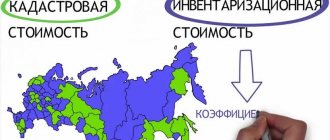On January 1, 2021, changes to the tax code came into force, the essence of which boils down to the following: now not only residents, but also non-residents have the opportunity not to pay tax on income from the sale of real estate.
Undoubtedly, these are positive changes that directly affect a fairly wide range of individuals - non-residents of the Russian Federation who own real estate in our country.
A reader inexperienced in legal subtleties will not immediately understand what the new wording of the law is and what the benefits are for a taxpayer who is a non-resident of the Russian state.
Therefore, we will explain in detail, avoiding clerical cliches, in normal, “human” language, what the significance of the changes made is.
But before we begin our explanation, we will first define the terms used in this issue, namely, who are tax residents and non-residents.
Personal income tax
Citizens' incomes are divided into two groups depending on the source of payment. He may be in Russia or abroad. And if residents pay personal income tax on all their income, regardless of its source, then non-residents pay only on income from sources in the Russian Federation.
If a non-resident receives a salary abroad, it is not subject to personal income tax. Moreover, this applies even to those cases where the customer is geographically located in Russia, but the contract states that the employee operates outside the country.
Let's say a non-resident works honestly, paying taxes abroad. And if he decides to transfer his salary to a Russian bank account, then no income will be generated, because the operation involves the transfer of personal funds. Accordingly, you will not have to pay tax.
When many citizens mention income, they usually mean salary. However, in reality there are many types of income. A person can receive money by renting out an apartment, selling securities, cars or other property, using a patent or copyright in a certain country.
If a non-resident has income in Russia, then as a general rule he pays 30% of the funds received. There is also a reduced rate of 15%. It works if a non-resident receives dividends from Russian organizations.
In 2021, there were changes to the taxation procedure for interest on deposits in Russian banks. Currently, the procedure for calculating tax for residents and non-residents is the same. Personal income tax is imposed on interest on deposits that exceed a certain limit. To calculate it, the key rate as of January 1 of the reporting year is used. For example, in 2021 the limit was 42,500 rubles.
Personal income tax rates exist in two versions:
- 13% if the amount of interest on the deposit does not exceed five million rubles;
- 650 thousand rubles and 15% of the amount that exceeded 5 million.
Thus, it is not the amount of the deposit that is taxed, but the amount of interest accrued on it. The invested funds are the citizen’s personal money. There is no need to pay tax on them. But accrued interest is income, and accordingly, they are subject to taxation.
Federal Tax Service employees independently calculate the tax on interest on deposits, generating notifications and sending them to taxpayers. The latter must pay by December 1 of the following year. That is, if the notification was received for 2021, then the tax on it will need to be paid before December 1, 2022.
What to do with deductions
Non-residents do not receive tax deductions for treatment, purchase of an apartment or education. When selling real estate, non-residents are guided by a general rule. That is, if the property was owned longer than the minimum period of ownership, then the seller is exempt from paying personal income tax.
The whole world in your pocket
There is also a nuance in working as a self-employed person with foreign clients. If you are a non-resident in Russia, then the most profitable option is to separate income from Russia and from abroad. In the country of residence, work as an individual or as a local analogue of a Russian individual entrepreneur and declare foreign income on the spot, ignoring the status of self-employed in Russia. At the same time, the scheme of working with Russian companies remains the same: payment-check-tax, and then filing a second declaration for the entire amount at the end of the financial year in the country of residence. Thus, you will have to pay twice only for what you received from Russian counterparties.
If your days in Russia are enough to remain a resident, then it doesn’t matter where your customers are from. Simply, income in foreign currency when issuing a check must be converted into rubles at the Central Bank exchange rate on the day the money is received in the account. At the same time, as lawyer and tax consultant Marina Sukhovskaya notes, “even if the customer, Russian or foreign, does not need a check from a self-employed contractor, he is still required by law to generate one. If this is not done or done late, then a fine from the tax office is possible. For the first time it will be 20% of the amount of the incorrect calculation. If there is a repeated violation within six months, the fine will be the full amount of the incorrect calculation (Article 129.13 of the Tax Code of the Russian Federation).”
The only option in which a freelance specialist can avoid double taxes is to open an analogue of an individual entrepreneur in the country of tax residence. But in this case, work with Russian contractors will be limited - not everyone will want to deal with foreign contractors. However, the situation in each specific country may be different, so you will not be able to do without a local tax consultant.
About property taxes
Residence does not in any way affect the obligation to pay property taxes. That is, if a person has real estate, land or a vehicle on the territory of the Russian Federation, then he will have to pay for them. The rates and calculation procedures for residents and non-residents are the same.
Owners of apartments, private houses, garages, rooms, parking spaces and various buildings must pay property taxes on time. The need to pay it arises on the basis of property rights. That is, if the premises are in social rent, then you will not have to pay property tax.
The obligation to pay land tax applies to land owners. Moreover, a citizen can become the owner of an allotment on the basis of ownership, lifelong possession or perpetual use. The last two options assume that a citizen can exploit the plot (cultivate the land, erect buildings) without the right to dispose of the land. That is, it will not be possible to donate, rent out or sell the plot.
The main difference between these types of rights is that land with the right of lifelong ownership can be transferred by inheritance. If the plot is exploited on the basis of the right of perpetual use, then after the death of the citizen it will pass to the state.
Have a question for a lawyer? Ask now, call and get a free consultation from leading lawyers in your city. We will answer your questions quickly and try to help with your specific case.
Telephone in Moscow and the Moscow region: +7
Phone in St. Petersburg and Leningrad region: +7
Free hotline throughout Russia: 8 (800) 301-39-20
What is a double tax treaty?
According to interstate agreements, standards are established for the payment of taxes on the profits of individuals and legal entities whose income-generating assets are located outside the country of their citizenship. The Treaty on the Elimination of Double Taxes regulates the following situations in 2021:
- The types of taxes are specified and the persons to whom this agreement applies are listed.
- A procedure has been established for the distribution of tax revenues from all income between countries.
- The validity period and conditions for termination of the agreement are indicated.
Thanks to such international arrangements, certain types of financial transactions are exempt from taxation in one of the two countries. Or taxes are paid, but on preferential terms. This helps taxpayers reduce costs several times, optimize transactions and develop relationships with foreign countries.
Find out how double taxation agreements work in Russia from the video below.
Russia has concluded 83 agreements on the avoidance of double taxation with other states.
Transport tax
If a citizen is the official owner of a vehicle, he is required to pay transport tax. The vehicle category includes:
- cars;
- snowmobiles;
- motorcycles;
- boats;
- airplanes, etc.
Property tax rates are set by local and regional governments. The amount of tax depends on the type of property, its location and value. Some categories of citizens may qualify for benefits. We are talking about disabled people, pensioners, military personnel, large families, etc. Tax resident status does not affect rates or benefits.
Availability of accounts in foreign banks
Let’s say a person who spends most of his time outside the Russian Federation has an account in a foreign bank. And while he lives in another country, spending less than 183 days a year in Russia, he is not required to submit reports and notifications about his foreign accounts. It’s another matter if this person spends more than 183 days a year in the Russian Federation. Then he will need to notify the government about the existence of an account in a foreign bank and report on the flow of funds. This must be done before June 1 of the year following the reporting year.
Cash flow reports may not be submitted if the following conditions are met:
- The account was opened in a bank located on the territory of a country that is part of the EAEU or a state with which Russia has established an automatic exchange of information.
- The amount of credits to and debits from the account is less than 600 thousand rubles. If there were no deposits during the year, then the account balance should be less than 600 thousand rubles at the end of the year.
Citizens planning to return to the Russian Federation are advised to close all accounts in foreign banks before moving. Otherwise, the person will have to submit all notifications and reports within the prescribed period.
If the notification deadline is not met, the citizen will receive a fine of 1000-1500 rubles. If notification is not provided - from 4,000 to 5,000 rubles. The fine for failure to comply with reporting deadlines is 300-3000 rubles. These sanctions are spelled out in Article 15.25 of the Code of Administrative Offenses of the Russian Federation, which defines administrative liability for violation of the currency legislation of the Russian Federation.
What does double taxation mean?
Double taxation refers to the mandatory payment of income taxes in different countries. This usually concerns those who are citizens of one country and receive income in another.
To optimize the process and reduce the already considerable costs of paying fees, the Russian government signs agreements with other states. This helps avoid paying double taxes.
Reasons for Double Taxation Questions
The most common reasons for double fees:
- Citizenship and source of income in different states. A person lives in one country, and receives profit in another. In this case, both states claim the taxpayer's income. This applies to property owners, those who do business abroad, come to work, etc. In such situations, one of the two countries must exempt the person from paying taxes. If this does not happen, double taxation comes into force.
- A person has residence in several countries at once. A resident is a citizen who lives in his native state or for a long period in another. For example, foreigners living in the Russian Federation for more than 183 days acquire resident status. If an agreement on the avoidance of double taxation has not been concluded between two states, then the resident will pay tax both in his home country and in the country where he receives profit. As a result, income may be significantly reduced or disappear completely.
A resident is a citizen who lives in his native state or for a long period in another.
- If a Russian citizen has a business in Finland, and raises money for this from Belarus, then all three countries can require payment of taxes. Russia will collect tax as from its citizen, Finland - from a foreigner engaged in business activities on its territory, and Belarus - from the consumer of its funds. Such circumstances require the elimination of double taxation, otherwise doing business/work outside the home country becomes impractical.
- In some cases, such as international shipping, countries may impose additional tax requirements. They are guided by the fact that a person does not have sufficient connections with his homeland. Despite the prohibition of such conditions by international law, the trend is often visible. In such situations, an agreement to eliminate double taxes between Russia and the United States is very important, since in America the lack of ties between a foreigner and his homeland is one of their first arguments.
- “Triangular” conflicts often arise among legal entities when a representative office is located, for example, in Bulgaria, branches are in the Netherlands, and income is received in Lithuania. In the absence of an agreement to avoid double fees, all three states will require payment of taxes.
you can here.
Notification of Citizenship or Permanent Residency
Let's say a person lived in another state for several years. He has already received or is planning to obtain citizenship, a residence permit or another document allowing permanent residence in the country. Then he must notify the territorial bodies of the Ministry of Internal Affairs of the Russian Federation located at his place of residence about the paperwork.
If the applicant does not have permanent registration in the Russian Federation, then the notification should be submitted to the territorial bodies of the Ministry of Internal Affairs of Russia at the place of actual location or temporary stay. The document is submitted in person or through the Russian Post Office. At the moment, it is not possible to send papers electronically.
Submission deadlines
Notification of citizenship must be submitted within the following deadlines:
- Within two months from the day the person received citizenship or permanent residence permit in another state.
- Within a month from the date of entry into the Russian Federation, if the applicant permanently resides in another state. The need to submit a notification also remains if the citizen returned to Russia for only one day.
By violating the deadline for submitting a notification, a citizen may receive an administrative fine in the amount of 500-1000 rubles. This is stated in Article 19.8.3 of the Code of Administrative Offenses of the Russian Federation. It is worse if the citizen does not submit a notification at all. In this case, he may be prosecuted under Article 330.2 of the Criminal Code of the Russian Federation. This article provides for punishment in the form of a fine of up to 200 thousand rubles or compulsory labor for up to 400 hours.
Insurance premiums from non-residents
In Art. 420 of the Tax Code of the Russian Federation provides that the object of taxation with insurance premiums is payments and other remuneration in favor of individuals subject to compulsory social insurance in accordance with federal laws on specific types of compulsory social insurance. These include the laws “On compulsory pension insurance in the Russian Federation” dated December 15, 2001 No. 167-FZ, “On compulsory medical insurance in the Russian Federation” dated November 29, 2010 No. 326-FZ, “On compulsory social insurance in case of temporary disability and in connection with maternity" dated December 29, 2006 No. 255-FZ. These laws establish, in particular, a list of persons who are recognized as insured under these types of insurance.
Contributions for injuries are still regulated by the law of July 24, 1998 No. 125-FZ.
The calculation of contributions for compulsory pension and compulsory health insurance, as well as contributions for temporary disability and injury to a foreign worker depends not on his tax status (resident or non-resident), but on his legal status in Russia:
- refugee;
- received temporary asylum in the Russian Federation;
- citizen of a member state of the EAEU;
- permanently residing in the Russian Federation;
- temporarily residing in the Russian Federation;
- temporarily staying in the Russian Federation;
- highly qualified specialist.
For compulsory pension insurance of foreign workers of all listed statuses (except for highly qualified specialists), contributions are calculated from payments not exceeding RUB 1,465,000 in 2021. at a rate of 22%, and from the excess amount - at a rate of 10%. Contributions to compulsory pension provision for highly qualified specialists are not accrued (including for bonuses paid to such employees after their dismissal).
Find out how to pay insurance premiums for highly qualified specialists by getting free trial access to ConsultantPlus.
Find out whether to pay pension contributions for EAEU citizens temporarily staying in Russia here .
Contributions for compulsory temporary disability insurance for payments exceeding RUB 966,000. (in 2021) are not awarded to all specialists, regardless of status.
Contributions from payments not exceeding RUB 966,000. are accrued at a rate of 2.9% to foreigners of all statuses, except those temporarily staying in the Russian Federation. For payments to foreigners temporarily staying in Russia, contributions for temporary disability are calculated at a rate of 1.8%, and for payments in favor of temporarily staying highly qualified specialists, insurance premiums are not calculated.
Contributions for compulsory health insurance are paid at a rate of 5.1% of payments made to refugees, citizens - members of the EAEU, foreign workers permanently or temporarily residing in the Russian Federation. Contributions for this type of insurance are not paid from payments made in favor of highly qualified specialists temporarily staying in the Russian Federation.
In accordance with the law of July 24, 1998 No. 125-FZ, foreigners, along with citizens of the Russian Federation, are subject to insurance against industrial injuries. Contributions for insurance against industrial accidents (contributions paid to the Social Insurance Fund) are calculated at the same rates as for payments to employees - citizens of the Russian Federation.
You can read more about insurance premiums for payments to foreign employees working remotely in the article “Insurance premiums are not charged for payments to “remote” foreigners .
About insurance premiums from foreigners
What taxes does a non-resident need to pay?
Depending on the circumstances, a non-resident of the Russian Federation may have obligations to pay the following taxes:
- Personal income tax. It is paid only if the person received income from Russian sources. There is no need to report income received in the territory of another state.
- Land tax. Paid by those persons who own land in Russia.
- Property tax. It is accrued if Russian real estate is registered to a non-resident.
- Transport tax. Paid by those citizens who are owners of vehicles registered in Russia.
Thus, non-residents are not exempt from paying taxes in the Russian Federation. Failure to pay or late filing of reports is subject to fines and other sanctions.
Can non-residents take advantage of tax deductions?
If individuals are not recognized as residents of the Russian Federation, then they are not entitled to property tax deductions. This conclusion can be drawn if we consider the provisions of sub-clause in their entirety. 3 and 4 tbsp. 210, subp. 1 clause 1 art. 220, paragraph 3 of Art. 224 Tax Code of the Russian Federation.
Moreover, they do not have access to a simple operation to reduce the income received from the sale of property by the amount of costs incurred in acquiring this property. The fact that non-residents cannot use sub. 2 p. 1 art. 220 of the Tax Code of the Russian Federation and deduct expenses from income, is reflected in several letters from the Ministry of Finance of Russia, for example, dated 04/08/2013 No. 03-04-05/4-347, dated 03/26/2013 No. 03-04-05/4-285 and dated 11.10 .2010 No. 03-04-06/6-248.
The authors provide the following arguments in favor of this statement. A decrease in the amount of income by the amount of expenses incurred, in their opinion, is nothing more than a tax deduction. And in para. We have already found a solution to this point: deductions are not available to non-residents. This means the operation “income minus expenses” too.
Find out whether it is necessary to collect personal income tax on the income of foreign workers - freelancers, from the material “Distance worker - foreigner: what to do with personal income tax” .








